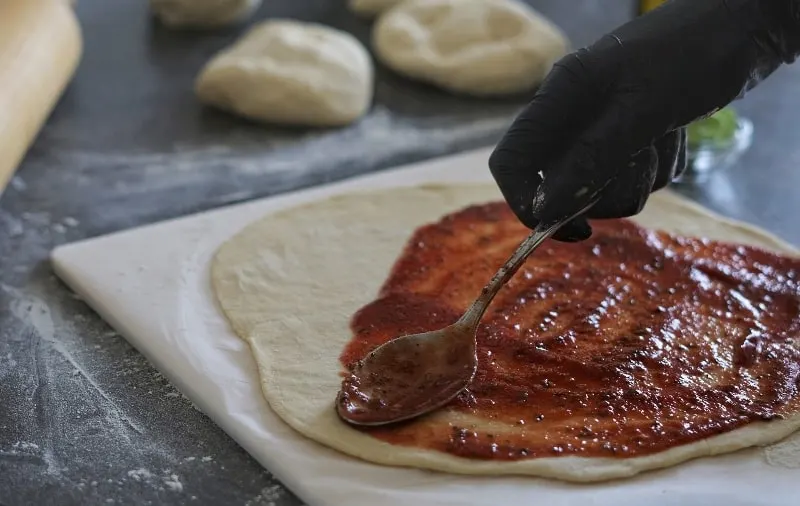If you leave almost any dough out overnight there’s a high risk that it will overproof. If the dough is warm and it contains a lot of yeast, it’s almost definite that it will overproof by the time you wake up.
Fortunately, there are ways to prevent it from overproofing, but even if it does, you’ll still be able to use it to make pizza.
Pizza dough can be left out overnight provided that it is a lean dough. However, since it will be out for 8-10 hours, it’s likely to overproof. To prevent this, it should be stored in a cool environment and less yeast should be used. Alternatively, it can be stored in the fridge for better results.
If the dough contains anything like milk or eggs (food that can go bad quickly at room temperature), it shouldn’t be allowed to sit out any longer than 1-2 hours or you risk the dough developing too much bad bacteria. This kind of dough (enriched) needs to go in the fridge if it’s not going to be baked within a few hours.
Any kind of pizza dough should just contain flour, water, salt, and yeast, with the addition of oil in some dough.
Although pizza dough can be kept out overnight, it doesn’t mean that it should be. The results will be better in a cold environment. The dough benefits from a longer rise over many days in the fridge and it shouldn’t overproof. It becomes more elastic and flavorsome, which is ideal for pizza.
Here’s When You Shouldn’t Leave Your Pizza Dough Out Overnight
Whilst it’s perfectly safe to leave normal pizza dough out overnight, it does increase the risk of problems occurring. For this reason, it’s not always advisable.
Here’s when you should avoid leaving your pizza dough out overnight:
If You Have A Warm Home
For any kind of dough to rise for a long duration of time and not overproof, it needs to be kept in a cool environment. This is because a warm environment speeds up the activity of the yeast, which causes it to burn through its food supply faster and therefore overproof faster.
If you were to leave it out overnight in a warm room, it would likely overproof in a matter of hours and you’d be left with a ball of dough that won’t rise anymore.
If The Dough Isn’t Lean
99% of pizza dough contains the basic ingredients of flour, water, salt, and yeast (and oil in a lot of cases). These ingredients are what make a dough lean.
If pizza dough were to contain anything other than these ingredients, such as milk or eggs, it’s considered enriched or rich dough.
Since ingredients like milk and eggs don’t do well at room temperature, they’re not going to do very well after being mixed in with dough and allowed to sit out for 8-10 hours.
There’s a high likelihood that they’ll both spoil and you can get ill if you eat pizza made from this dough.
What To Do If Your Dough Overproofs
Dough that’s overproofed is never fun since you can’t get any more rise out of it during baking.
If you overproof bread dough, you’ll get bad bread from it, but if you overproof pizza dough, you can still make pizza.
Since pizza is flat and doesn’t necessarily need to rise very much, it doesn’t mean the end of the world if it’s overproofed
If this ever happens, you can roll the dough out flat, add the toppings, and bake it as normal. Sure, it won’t be as good as dough that hasn’t overproofed, but it’s still pizza and tastes pretty good for what it is.
If you want to take things a step further, you can make something similar to a grilled pizza. This is a fun alternative to regular pizza and it tastes great. Look it up!
Tips For Leaving Pizza Dough Out Overnight
If you’ve decided that you’re going to/need to keep your pizza dough out all night, there are some things to keep in mind before doing it. So you don’t end up being disappointed, here’s what you should know before you go ahead and leave your dough out at room temperature.
Keep It Cool
To slow the rise, you need to slow the yeast activity. Since temperature is such a large contributor to how quickly the yeast works, it’s better to use store the dough somewhere cold.
Since nights are generally cooler, this can help you out depending on where you live. If possible, find an area of your home or a building outside that’s cold and put the dough there overnight.
This might be next to a window, garage door, outdoor shed, etc.
Just make sure that the dough is tightly sealed in its container so it doesn’t dry out and nothing gets into it.
Use Less Yeast
The more yeast you add to your pizza dough, the faster it will rise, so using less yeast will help you out by slowing the rate of the rise.
Using considerably less yeast will mean that it takes a much longer time for it to consume all of the starches and sugars in the dough (overproof), so you can come to find a beautifully risen ball of pizza dough when you wake up.
8-10 hours is a long time for your dough to rise, so you need to cut back on the yeast drastically. Using less than 1g of yeast per 500g of flour should slow the rise enough to just last overnight, but only if the temperature is appropriate. If it’s too warm, it could still rise completely and overproof in around 3-5 hours.
Make Sure It’s Covered Tightly
The last thing you want is to wake up in the morning to find that the surface of your dough has dried out or bugs have somehow gotten onto your dough.
For this reason, it’s essential that you make sure the dough is tightly covered either with a lid or plastic wrap. This will help maintain the humidity in the air surrounding your dough, which will prevent drying, and it will ensure that nothing can get into the dough container.
Consider Refrigerating It
If you have a good reason for not refrigerating your dough, such as that it can’t fit, then you’re at a disadvantage.
Refrigerating your dough is a much better option and you should consider doing it if you haven’t already. The results you get are more reliable, consistent, and it’s much less likely to overproof easily.
The temperature is stable in the fridge, which means that you know that the rate of the rise will be slower and you won’t have to worry about it overnight.
Unless you’re positive that your dough will be completely fine outside of the refrigerator, it’s best to just put it in so you can know that it’ll be fine.

